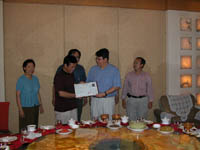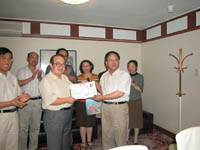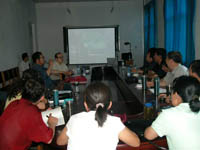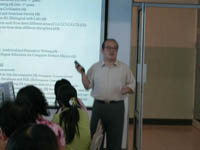
| English |
| 中 文 |
|
|

| ||||
| |||||
|
|
The College of Computer and Information Engineering (CCIE) was founded in 2001 by combining the original Department of Computer of the College of Inner Mongolia Agriculture and Animal Husbandry with Computer Teaching and Research Section of Inner Mongolia Forestry College. CCIE consists of Software Teaching and Research Section, Hardware Teaching and Research Section, Computer Hardware Lab, Network Lab, Computer Center. Additionally, CCIE Cisco Network Academy, Shuhua Electronic Intelligence Center and Prometric Authorized Testing Center are also attached to CCIE. CCIE has a faculty of 52 young and capable members including 5 professors, 11 associated professors, 25 lecturers, 11 teaching assistants and other staff. CCIE now has three undergraduate programs: the Computer Science & Technology , Information Management & System and Software Engineering. It offers five levels of education: the general undergraduate course, adult undergraduate course, professional course, correspondence undergraduate course and computer minor. Altogether there are 729 students at school. Besides the courses for CCIE majors, it also gives lessons for all students of other majors. For several years, CCIE has cultivated more than 650 professionals with sound basic theory and skills in computer science and technology who are widely accepted by the society and the employment ratio has reached 100 percent. CCIE has complied several textbooks, one national and two regional, one of which was appraised as Regional Excellent Textbook. CCIE has been exploring teaching innovations, presiding and taking part in many important innovation projects established by the Ministry of Education and Ministry of Agriculture. One accomplished teaching innovation project was evaluated as the Second Prize of National Teaching Achievement. One course was appraised as Regional Teaching Achievement. One course was appraised as Regional Excellent Demonstration Course. CCIE has stable research areas on digital image processing, network, artificial intelligence, statistic and computer aided instruction. CCIE has taken charge and participated in the National Key Research Projects of Science and Technology in the ninth “Five-year Plan ”, the Regional Key Research Projects of Science and Technology in the eighth “Five-year Plan”, as well as Research Projects sponsored by the National and Regional Science Funds and Scholastic Youth Funds, etc. One teacher was awarded the Second Prize of Regional Science and Technology Advancement, 2 were awarded the Third Prize of Bureau Level. The faculty has published more than 50 academic papers, complied 10 textbooks and 7 experimental instructions. CCIE Computer Center has more than 400 microcomputers and other teaching equipments, which facilitate all students of computer majors and non-computer majors in the university. CCIE has Hardware Labs of Computer Organization and Architecture, Microprocessor Principle, Single-Chip, Digital Communication, Operating System and Network that meet the needs of all teaching and experimental requirements of the university. CCIE has carried out the Party's Educational Policy thoroughly, and has been undergoing teaching innovation, placing emphasis on the students' innovation ability. CCIE Staff has gained 3 National Patents. Some students have won prizes and achievements for their excellent performance in all kinds of After-School Activity Competitions of the Region. At present, the Computer Science and Technology Major has been listed as the National Key Courses. Facing with the new situation and the developing tendency of 21 Century teaching innovation, CCIE will make adjustments on curriculum in order to cultivate highly specialized professionals for regional economical construction while conducting its undergraduate education. As for the teacher education, CCIE tries in every way to enhance the teacher's academic levels. The Application Software Institute recently established by CCIE will contribute to the regional economy construction. Furthermore, it will enhance the teacher's ability of integrating theory with practice so as to improve the teaching quality and cultivate more qualified professionals for our region and country. |

| |

| |||

| |||

| |||

| |||

| |||

| |||

| |||